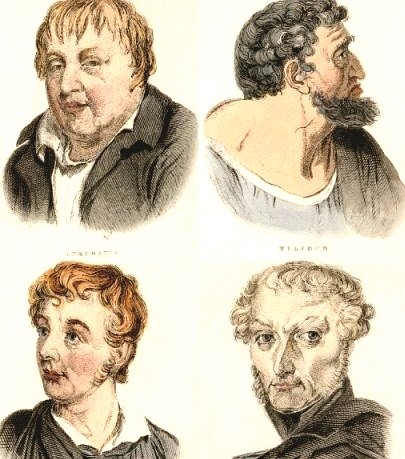How to recognize one's temperament

The Iranian-Islamic traditional medicine is a holistic medicine which has been based on individual differences, a determinant basic concept named as Mizaj (temperament).
Generally, Mizaj represents the excess or lack of warmness and humidity in one's body and is classified into four categories- also called four qualities- of warmness, coldness, dryness and wetness.
The tempers (Amzajeh) are classified totally into nine categories: Moderate, warm, cold, wet, dry, warm and dry, warm and wet, cold and dry, cold and wet.
Displaying some identifying behavioral and physical characteristics would describe one's temperament.
Frame
Being stout, sturdy, big-boned and prone to gain weight are signs of wetness while not gaining weight and being thin are the distinguishing characteristics of dryness.
Body parts
Bigger faces, fingers, lips, noses, organs, and body parts are defining characteristics of people with wet Mizaj whereas people with dry Mizaj have smaller body parts.
Complexion
Rosy and ruddy complexion is a sign of warmness and wetness, while having a yellow cast is sign of warmness and dryness, on the other hand light and fair complexion is a distinctive characteristic of people with wet and cold Mizaj. And last but not least people with cold and dry Mizaj have a dark complexion.
Hair
People with dry Mizaj have coarse, curly and coily hair; warmness cause the hair to grow faster and people with warm Mizaj have thick black hair, with thick density and more volume. Silky, straight, smooth, thin and fair hair which grows slower is a distinctive characteristic of people with cold Mizaj. Wetness would cause the hair to easily hold a curl or style.
Skin
People with dry Mizaj Have dry skin and people with wet Mizaj have soft and squishy skin. Having naturally high body temperature once someone touches people with warm Mizaj tells they are warm. People with cold Mizaj feel cold and run colder than the other people and once someone touches them can tell they are colder than normal.
Activity
Warmness brings about increase in exuberance and energy level which boost speech and body movements speed while coldness causes quite the reverse symptoms as people with cold Mizaj don’t have much energy and are generally slow, they take their time speaking and acting.
Mental trait
People with warm Mizaj are normally and usually more extrovert, sociable, and maybe less patient but people with cold Mizaj are more introvert, calmer, and more patient. People with warm Mizaj are more inclined to suffer stress and restlessness; however, people with cold Mizaj have a tendency to experience depression and melancholic thoughts and have hallucination or sometimes delusions.
However, keep in mind that one’s personality traits may be modified or changed due to various factors such as upbringing, religion, spirituality, and one’s striving to change their attitude. Therefore one’s personality may not necessarily match their temperament.
Sensitivity
People with warm Mizaj are more sensitive to warmness (surrounding environment, foods and drinks); those with cold Mizaj are more sensitive to coldness; those who have dry Mizaj are more sensitive to dryness and those with wet Mizaj are more sensitive to humidity.
Sleep
Sleeping too much or sleepiness is a sign of wetness and needing much less sleeping hours is a defining characteristic of dryness.
Waste matter
Waste matters (e.g. urine, sweat, and feces) in those with warm Mizaj have strong color and odor while in people with cold Mizaj the waste matters don’t have strong color or odor.
Seyed Mahdi Mirghazanfari, MD, holds a PhD degree in medical physiology and is an Iranian-Islamic traditional medicine researcher. He is also an assistant professor in AJA University of Medical Sciences, Tehran.
MQ/MG
Leave a Comment